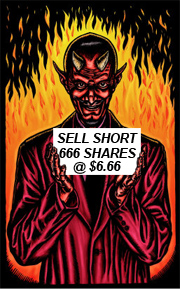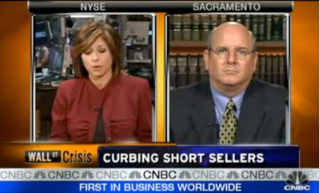Short Sellers in the Crosshairs
The myths and facts about short sellers: the perpetual scapegoats of market crises

In times of loss, human nature leads people seek out those responsible for their loss and hold them accountable. Such is the case in cases of financial loss during economic crises and stock market pandemonium. An investor who has lost large sums of money naturally wants to seek out the cause and find ways to prevent further losses from recurring, and maybe extract a little tit-for-tat on those they deem responsible. At first blush this seems reasonable, however the ultimate conclusions drawn often are not discoveries that bring enlightenment, but rationalizations which erroneously redirect blame. They conjure up visions of demonic dark forces working against the common good, and find scapegoats to blame, rather than facing inconvenient and unpleasant realities. In times of financial crisis, short sellers are often such a scapegoat. Often painted as dark menacing villains hoping for the downfall of the financial markets, they are an ideal target for those wishing to sidestep reality and often their own complicity in financial turmoil.
What is a short seller?
A short seller is an investor or trader who "sells short" a stock or other security, profiting if the price of the security drops instead of if it rises. When a short seller opens a position, he borrows shares of a security and simultaneously sells them on the open market. The short position is later closed by buying the shares on the open market (hopefully at a lower price), and simultaneously repaying the shares that were borrowed initially. Since a short seller has the opposite interests to those who own the same securities long, they are sometimes mistakenly seen by long-only investors as being harmful to their interests and the market.
Why do short sellers become
scapegoats?
To understand why short sellers are selected as scapegoats, it is useful to understand what factors influence investors' understanding of the causes of portfolio losses. I believe as investors search for the causes of losses, they can be unduly influenced by the desire to oversimplify a complex problem, and by their denial of their deficiencies in understanding their portfolios and in their strategies. I believe that the media also plays a role, in that simple villains like short sellers make for better sound bites than explaining the complexities of market price influences. Finally, there are some market participants who would benefit from restricting or eliminating short selling completely, to remove much of the scrutiny when they take an overpriced stock offering to market.
"What is a credit default swap, and where can I find him so I can wring his neck?!"
The underlying causes of market fluctuations can be complex. Many investors who do not study financial markets full-time often don't have the inclination or sophistication to understand the complexities of market movements which affect their portfolios. The drop of the S&P 500 from its all-time high of 1565.15 on Oct. 9, 2007 to a low of 672.88 on March 9, 2009 was a result of many complex factors, which I would summarize as:
When at its high, many of the S&P 500 constituent companies were overvalued due to inadequate discounting for risk. The risk was partly caused at its root by dubious securitization of home loans and inadequate lending standards, leading to dubious balance sheets in the finance sector, whose resultant instability exposed the risk of companies using significant amounts of leverage, which at the time was prevalent among even "blue-chip" companies. Adding to this risk was the historically unprecedented amount of consumer debt, especially revolving debt, which created risk for the economy in general. And later, when at its low, there were many S&P 500 constituents which were undervalued due to excessive discounting for risk (market "panic"), the price-depressing effects of forced sales as margin calls liquidated over-leveraged individuals and funds, as well as the effects balance sheet erosion caused by a price bubble in credit default swaps.
And while much of my analysis is subject to debate, clearly the underlying causes are extremely complicated. To many investors, understanding these complexities is either impractical or even impossible, as they lack the time or possibly the sophistication to grasp and quantify the factors causing market price movements. For them, a simpler explanation may be more attractive, not because it is correct, but because it is easier to grasp.
 "I'm an above-average investor, so obviously someone else is to blame for my losses."
"I'm an above-average investor, so obviously someone else is to blame for my losses."
Investors often harbor a false sense of security about their investment acumen and strategy. Studies show that roughly 75% of investors feel that they are "above average". But even if investors avoid more "obvious" perils such as leverage and buying on margin, over-concentration in single assets or asset classes, or dubious securities or funds, they often overestimate the quality of their portfolio, based on an inadequate understanding about its makeup and an overestimation of its diversification.
The "research" that many mutual fund investors do only covers funds at a high level. Historical price performance, fund objectives, fund management and fund strategy are often considered, but rarely do mutual fund investors really know what they're actually buying. What are the companies that the fund owns really worth? Are their individual stock prices overvalued or undervalued? How leveraged are the companies in the portfolio? Are the stock prices adequately discounted for risk? Do any of their balance sheets contain CDOs or CMOs that might end up being severely discounted? I bet very few mutual fund investors knew these answers in 2007, and yet investment kept pouring in, with mutual fund assets at $26 trillion worldwide in early 2008.
Meanwhile there is also a false sense of security about diversification. Modern money managers tout the advantages of a "diversified" portfolio of stocks, bonds mutual funds, cash, and potentially commodities distributed across different market cap sizes, industries, and geographies. Yet in the economic crisis of 2008, this so-called "diversification" protected very few, and unless they were completely in cash, most investors' portfolios moved to a large degree with the market at large -- in a downward direction. The fact is that most investors do not fully understand how tightly correlated many of their asset classes are, and many money managers are reluctant to tell them, lest they lose recurring revenue streams that come from re-balancing portfolios to maintain the "illusion" of diversification.
To some investors, admitting deficiencies in their understanding of portfolio assets and strategy is so unpalatable that an alternative explanation for their losses becomes attractive. For them, placing responsibility for losses on short sellers is easier than admitting that they are not "better than average".
 When the truth makes awkward storytelling, the truth gets short shrift.
When the truth makes awkward storytelling, the truth gets short shrift.
In an age in which news and entertainment have become intermingled, all too often "news reporting" becomes tainted with dramatic overtones and wrapped up in a two-minute-long summary. The audience of the story is framed as an implicit "hero", battling against a the dark forces of an opposite political party, war adversary, short seller, or any other easy-to-package and easy-to-digest villain.
In the case of the 2008 financial crisis, the true "villains" were the complex combination of regulators, legislators, bankers, consumers, and investors, who both introduced and ignored risk. And when the truth makes for awkward storytelling, the truth often gets short shrift.
Some market participants would benefit from restricting or eliminating short selling completely.
Certain market participants, like investment bankers who exaggerate the prospects of the companies they are offering, and dishonest and/or ineffective corporate governors and management, benefit from avoiding the scrutiny of short sellers. They are usually the first to point to short sellers as the cause of market pricing collapse, when in fact their prior inflation of market prices likely did far more to cause it.
About the author: Steve Smith is a professional investor with a portfolio containing both long and short investments.
© 2010 smitherspoon.com